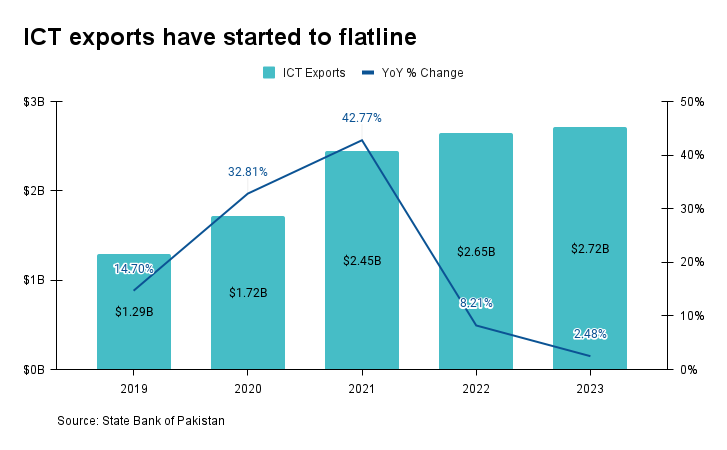Whatever the answer is, the underlying slowdown in ICT exports is extremely concerning and warrants the immediate attention of the policymakers. According to the Pakistan Software House Association, we have the fewest number of ICT support policies (8), compared to other emerging markets where India leads at 27 and Bangladesh at 20.

Fig: IT Support Policies Across Countries
So if we are to compete against them in a globally competitive market, then it’s only fair that we are treated at least somewhat similarly by our authorities. Every year around budget, P@SHA proposes detailed recommendations on how we can narrow this gap between ourselves and the rest. Hopefully, the decision-makers will get to all of those pointers in about time. But some things can’t wait. Literally.
Given all the economic and political uncertainty, the country’s tech talent is moving abroad in droves and can no longer wait around for things to get better. In 2023, 22,760 highly qualified Pakistanis left for greener pastures — by far the highest on record. On top of it, some of the best minds prefer to take the freelancing route, further limiting the available supply.
If the industry wants to grow, we must figure out how to 1) retain the existing pool 2) and increase the pipeline. If we are to get out of the single-digit growth rut in exports, as was the case for the last two years straight, we need to significantly expand our key input i.e. human capital. This should be the single most important policy goal, both in the short and long run and all our measures should be focused towards it.
So what can we exactly do about it? Well, there is no shortage of recommendations with a lot of emphasis on tax exemptions. Currently, export-oriented IT in Pakistan services have a concessionary income tax rate of just 0.5%, which can also be retrieved in the form of credits. Of course, income tax is just one of the many taxes we pay as citizens of this country. Add to it the taxes paid on the purchase of products and services on various items, such as the 3% customs duties on computers and accessories.
Anyway, let’s not digress. While P@SHA has been calling for a tax exemption altogether instead of the existing credit system, I feel we are missing the forest for the trees. Sure, a favorable regulatory structure would do well for the industry and probably encourage more players and investments in the long run. Disregarding our government’s limited fiscal space for a second, shouldn’t the more pressing concern be: who will they even hire?
In my view, one way to address this problem could be a flat tax, say 3%, on the turnover of IT companies but in return employees get an exemption. Sure, it would erode a portion of the margins and add directly to the costs a bit. But at the same time, it can significantly help with employee retention, who’d now enjoy higher or on-par disposable incomes.
Even cost-wise, the impact may not be as big as it appears on the first look. After all, companies already spend a great deal in either trying to retain talent through pay increases and other benefits or finding replacements. All of that takes money. There would be some less quantifiable upside as well. Imagine the same engineer leading a long-term enterprise project from day one to the very end — how many hours of back-and-forth meetings and code reviews would that save?
In theory, this is the easier solution though depends a great deal on the willingness of the powers that be. The more long-term approach would entail significantly expanding the talent pool, by any means available. From training and rechanneling STEM students towards tech to setting up state-funded engineering schools that can produce tens of thousands of graduates every year, we need it all.
Maybe that’s wishful thinking to expect too much government. In that case, or regardless, the industry must step up. I don’t mean standalone semi-structured training but standardized programs with proper recognition from top players. It may sound ambitious at first but we have seen something akin to this already. The Institute of Chartered Accountants of Pakistan could provide a possible blueprint in this regard for ensuring that its professionals are highly competent.
Of course, tech as an industry is too dynamic, democratic, and globalized to replicate the exact model but I am sure there are some things we could implement. Imagine a mechanical engineer obtaining a six-month certificate program in SQL from the Pakistan Software Export Board and transitioning toward a data role. With the right approach, isn’t that doable?



0 Comments